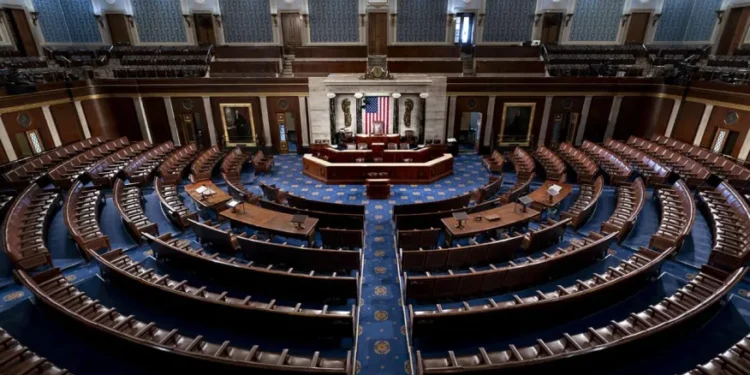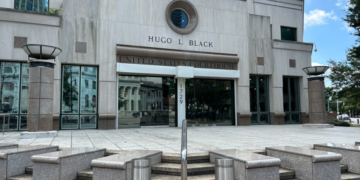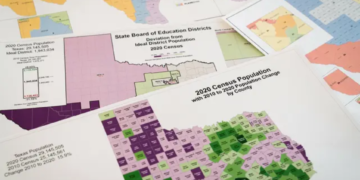April 10, 2025 Story by: Editor
Congressional Republicans have passed a bill that will make sweeping changes to voter registration, including requiring those signing up to present documents proving U.S. citizenship.
The Safeguard American Voter Eligibility Act, known as the SAVE Act, was first introduced last year as President Trump and his allies focused on the narrative that noncitizens presented a major threat to the 2024 election.
“Mr. Speaker, I rise to join my CBC colleagues in getting into some Good Trouble as we voice our very strong opposition to the Republicans’ voter suppression bill, the so-called SAVE Act,” Rep. Sewell said last week in opposition to the bill. “As a daughter of Selma and the Representative of Alabama’s Civil Rights District, the fight for voting rights is very personal to me. It was in Selma, 60 years ago, where John Lewis and hundreds of Foot Soldiers were bludgeoned on the Edmund Pettus Bridge for the right, the equal right of every American to vote. The legislation before us makes a mockery of that legacy.”
Lawmakers approved the Safeguard American Voter Eligibility (SAVE) Act in a 220-208 vote, with four Democrats joining every Republican present in support of the measure. (The legislation — formally titled the Safeguard American Voter Eligibility (SAVE) Act — passed in a 220-208 vote. Four Democrats — Reps. Ed Case (Hawaii), Henry Cuellar (Texas), Jared Golden (Maine) and Marie Gluesenkamp Perez (Wash.) — voted with all Republicans in favor.
The legislation, sponsored by Rep. Chip Roy, R-Texas, would amend the National Voter Registration Act so that states would be required to obtain proof of citizenship in person from people who are registering to vote.
The current federal voter registration form requires voters to swear — under penalty of perjury — that they are U.S. citizens, and some states take additional steps to verify citizenship. Noncitizens who attempt to vote face steep penalties like jail, fines and deportation.
The bill was first introduced last year as Republicans focused on noncitizen voting. Ahead of the 2024 election, Trump and his allies repeated claims that Democrats planned to cheat by encouraging noncitizens to illegally vote. Many political observers and election experts saw the baseless narrative as an attempt to sow doubt about the election results in case Trump lost.
Millions of Americans don’t have easy access to proof-of-citizenship documents.The requirement to show proof of citizenship would apply to new voters as well as existing voters who update their registrations, such as after a move or name change.
But one in 10 voting-age American citizens, or an estimated 21.3 million people, either don’t have a proof-of-citizenship document like a birth certificate, passport or naturalization certificate, or don’t have easy access to one, according to a 2023 survey commissioned by voting rights groups. The survey found people of color are more likely not to have a document proving citizenship.
Obtaining these documents takes time and money. Only about 43% of Americans have passports, according to an analysis by the Voting Rights Lab. The bill says voters can show an ID that indicates citizenship, but currently only five states — Michigan, Minnesota, New York, Vermont and Washington — offer IDs that meet that criteria.
Voters who don’t have a citizenship document with a photo, like a passport, would need to show two documents — such as a government-issued photo ID along with a document proving citizenship, like a birth certificate.
Married women who change their names will likely face additional requirements. Up to 69 million American women changed their names after they got married and therefore don’t have birth certificates that match their current names, according to an analysis by the progressive Center for American Progress. These women would likely need additional documentation, such as a name change document or marriage certificate, to register to vote.
Voter registration will likely require a visit to a government office. The bill specifies that if someone registers by mail they must present their documents “in person to the office of the appropriate election official” before the voter registration deadline passes (or if they are in a state where voters can register at a polling place, they could show their documents there). That requirement would also “completely upend” third-party voter registration drives that rely on mail forms, said Jonathan Diaz, an attorney with Campaign Legal Center, which advocates for expanded voter access and opposes the SAVE Act.
The bill does not mention online voter registration, which is an option in most states.
Some 80 million Americans registered to vote or updated their registrations between the 2020 and 2022 elections, according to data from the Election Assistance Commission (EAC). The most common way people registered was through department of motor vehicles offices, but 9% of voters registered to vote by mail, fax or email, and 14% registered online in 2022, according to the EAC.
Requiring voters to show documents in person would be particularly burdensome for rural voters, people who rely on public transit and people who cannot leave work during business hours. In the 30 largest counties by area in the West, voters would have to drive an average of 260 miles to get to their election office, according to an analysis by the Center for American Progress. The same analysis found some voters in Alaska and Hawaii could have to fly to get to election offices.
Raising the stakes further, the SAVE Act says election officials can face five years in prison or be sued if they register a noncitizen or a citizen who did not show proof. Siegrist worries he and his colleagues could be prosecuted for human errors or targeted by frivolous lawsuits.
The bill leaves the thorniest implementation questions up to states to decide with guidance from the EAC. If an applicant does not possess one of the proof-of-citizenship documents described in the bill, it says states should have a process for those applicants to submit additional evidence and for officials to decide if it is sufficient. The bill also says states should come up with accommodations for voters with disabilities.
The SAVE Act would require states to check voter rolls on an ongoing basis to ensure only U.S. citizens are registered. The bill would make it easier for states to use federal immigration data to do that, which has long been a point of contention between state election officials and the federal government.
Lawmakers in at least 18 states, including Texas and South Carolina, have introduced bills this year that would require documentary proof of citizenship to register to vote in state elections, according to an analysis by the Voting Rights Lab. New Hampshire passed a proof-of-citizenship law last year.
Kansas and Arizona pioneered such laws — and in both states they’ve been controversial.
In the first few years that Kansas’ law was in effect, more than 30,000 voter registration applicants were blocked due to not providing proof of citizenship — and a state expert conceded most of those people were citizens. In 2018 a federal court declared the state law unconstitutional.
Arizona uses a unique split system in which voters must prove citizenship to participate in state and local elections but not federal elections.
Unlike the protocol outlined in the SAVE Act, many Arizonans are able to fulfill the proof-of-citizenship requirement by writing their driver’s license or state ID number on the voter registration form, since the state’s motor vehicle division tracks citizenship. Still, some 32,000 Arizona voters are barred from voting in state and local elections due to proof-of-citizenship requirements, and an analysis by Votebeat found they are disproportionately young people near college campuses.
Last month, a federal appeals court found portions of two 2022 Arizona laws that would have imposed further proof of citizenship requirements to be “unlawful measures of voter suppression.”

















